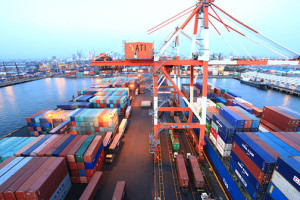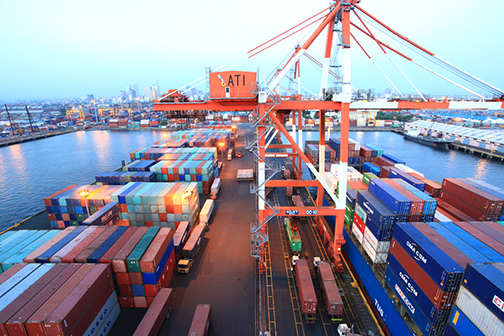 Truckers are asking port operator Asian Terminals Inc. (ATI) to provide additional equipment to support the demands of daily operations at the Manila South Harbor.
Truckers are asking port operator Asian Terminals Inc. (ATI) to provide additional equipment to support the demands of daily operations at the Manila South Harbor.
The Confederation of Truckers Association of the Philippines (CTAP), in a September 9 letter to Cabinet Secretary Jose Rene Almendras, head of the Cabinet Cluster on Port Congestion, said ATI “has no sufficient equipment that would (be) commensurate to the demands of their daily operations.”
To solve the problem, CTAP proposed that ATI “be required to purchase the necessary equipment” to improve their daily productivity to the benefit of all port users.
The organization said it was “commonly observed” that despite the opening of a 24-hour express trade lane for trucks during the duration of the Manila truck ban, the “problem with regard to port congestion and moving out and entry of containers from the port premises remains constant.”
The group clarified that the “congestion” at South Harbor is a “perennial” problem that was only made worse by the Manila truck ban. The ban has now been indefinitely lifted by Manila mayor Joseph Estrada starting Sept 13.
CTAP alleged that even before the truck ban, there was already “long queuing of trucks going to South Harbor (ATI) and while the trucks are inside, it will take 4-8 hours of waiting, like unloading of empty container and loading of import containers to our trucks (double transaction).”
Being directly affected, CTAP said it conducted its own investigations and held consultations with its members “to properly determine the root cause of problem.”
From these activities, CTAP said it determined that the cause of the “perennial problem” at South Harbor was the “inefficient and ineffective port management operations” of ATI.
“Vulnerable to corruption”
Moreover, CTAP alleged that ATI’s port management system was “highly vulnerable to corruption.”
It said its member-operators were “made to wait and queue for 4 to 8 hours due to the alleged non-availability of slots as advised by the checker/employee of shipping lines.”
“However, it is common knowledge that if monetary consideration (is) given that ranges from 300 to 800 pesos per slot, (a slot) would immediately be available,” CTAP said.
To remedy the problem, the group suggested that a list of available slots for empty containers be published on a bulletin board accessible to truckers and drivers, and that control of this information not be given to a checker or employee of shipping lines.
On September 29, CTAP held a meeting regarding its request for assistance from Secretary Almendras. In a text message to PortCalls, CTAP president Ruperto Bayocot said there was as yet no resolution to the matter.
ATI response
Dominador Antonio T. Bustamante, corporate communications manager of ATI, in an email to PortCalls said, “While we cannot comment on the issue as we have yet to receive a copy of the letter, it is important to note that the lifting of the truck ban has improved the situation at the ports.
“Since this positive development, yard utilization has eased, production has picked up and truck transactions have increased at Manila South Harbor. Traffic flow along the major arteries leading to the port has likewise visibly improved, even during rush hours. These gains, however, should be sustained to achieve long-term positive results.
“ATI is, thus, continuously investing on port infrastructure and equipment to cope up with future growth, aligned with our commitment with the Philippine Ports Authority.
“In line with ATI’s biggest investment program in history, we are heading for the second of three US$50 million annual capex in 2015, as we grow the size of Manila South Harbor along with the expanding economy.” – Roumina Pablo
Photo courtesy of ATI





